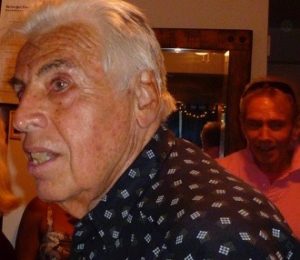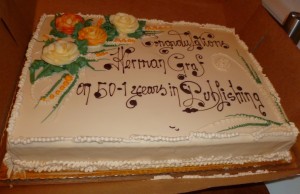Nick Robinson, RIP–Inspired Publisher and a Good Man
 When I was an editorial executive at Carroll & Graf Publishers from 2000 until 2007, Nick Robinson was a frequent publishing partner based in the UK. His company, Constable & Robinson, brought out many books in Britain that we then published in North America. Each publishing season there were between 10-20 titles. Mysteries, solid nonfiction like Jack Holland’s Misogyny: The World’s Oldest Prejudice, and lots of books that just balanced our list very well. A backbone of our program with them were the editorially smart, superb value-oriented series of Mammoth Books, with well over 75 titles in the program, some of them shown below. My senior colleague Herman Graf first met Nick in 1983. They worked together very closely, meeting in London and NYC and at the int’l book fairs. When I began attending the Frankfurt Book Fair for my new company I had the good fortune to meet Nick and work with him, too. He liked that I’d been a bookseller before I became an editor. Nick hired people well and so had great colleagues who always attended our group dinners in Frankfurt, including one female executive, Nova. At those dinners, he was always cheerful and funny, showed great knowledge of food and wine, and always called for a toast and set aside time for all to savor our collective moments together.
When I was an editorial executive at Carroll & Graf Publishers from 2000 until 2007, Nick Robinson was a frequent publishing partner based in the UK. His company, Constable & Robinson, brought out many books in Britain that we then published in North America. Each publishing season there were between 10-20 titles. Mysteries, solid nonfiction like Jack Holland’s Misogyny: The World’s Oldest Prejudice, and lots of books that just balanced our list very well. A backbone of our program with them were the editorially smart, superb value-oriented series of Mammoth Books, with well over 75 titles in the program, some of them shown below. My senior colleague Herman Graf first met Nick in 1983. They worked together very closely, meeting in London and NYC and at the int’l book fairs. When I began attending the Frankfurt Book Fair for my new company I had the good fortune to meet Nick and work with him, too. He liked that I’d been a bookseller before I became an editor. Nick hired people well and so had great colleagues who always attended our group dinners in Frankfurt, including one female executive, Nova. At those dinners, he was always cheerful and funny, showed great knowledge of food and wine, and always called for a toast and set aside time for all to savor our collective moments together.
Another of C & R’s books that C & G published in the US and Canada was The Great Hedge of India: The Search for the Living Barrier that Divided a People, a fascinating book on an entirely forgotten landmark from colonial India that actually figured in 20th century India’s history, though it had been all but forgotten. I still recommend this book to friends interested in the history of the subcontinent and those, say, who enjoyed Richard Attenborough’s film, “Gandhi.” Hedge author Roy Moxham also wrote, Tea: Addiction, Exploitation, and Empire, a book I still own and plan to read one day.
After leaving Carroll & Graf at the end of 2006 I learned from Herman that Nick and Nova had gotten married, and I was glad for them. At my new job, Union Square Press at Sterling Publishing, I had little reason to be in touch with Nick or his company, so we lost touch, though Herman kept me informed. He told me once that Nick had become ill, though he didn’t know if it was serious.
When I left Carroll & Graf, its parent company, Avalon Publishing Group, was on the brink of being sold to Perseus Books. Herman stayed around there for a little while, but soon the changes took full effect and Perseus absorbed many of the titles that we had published from Constable & Robinson. The crime books went to Soho Press, but the Mammoth Books stayed with Perseus, at Running Press. From time to time, I thought of Nick but after leaving Sterling in 2009 I had little reason to be in touch with him. But just last week, with August ending and the autumn publishing season commencing, I was planning to email Nick and let him know about a book project I’m developing, focused on classic swashbuckler fiction, that I knew would be of interest to him personally, and which I thought might be suitable for his company. I was so sad to read this morning in Book Brunch, a daily UK publishing newsletter, that Nick had died last Friday. The story (available by subscription only) reads in part:
Widely admired independent publisher Nick Robinson, 58, died on Friday 30 August 2013 following a longstanding illness. He founded Robinson Publishing in 1983, later merging it with Britain’s oldest independent publisher Constable & Co in 1999 to create Constable & Robinson. He brought new life to the Constable name, then propelled it into the 21st century with a series of innovations. Constable & Robinson was named both Independent Publisher of the Year at the Bookseller Industry Awards and IPG Independent Publisher of the Year in 2012….Nick Robinson is survived by his wife Nova Jayne – who also serves as a C&R director and now becomes Chair of the Board as part of the succession plan – and his son and his daughter.
Nick was a very good man and a brilliant publisher. I spoke with Herman Graf today. He told me that he considered Nick “a mensch for all seasons.” I know Herman will miss him very much, as will I, and all who had the good fortune to know and work with him. I extend my deepest condolences to his wife Nova, his two children, his colleagues, and all those among us who knew and admired him. Please click here to see all photos associated with this post.


